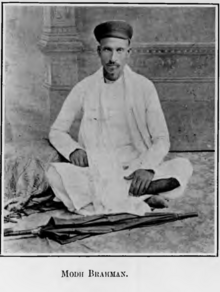Modh is an adjective often adopted in the surnames of Gujarati people who originate from Modhera in Gujarat.[1]
History
[edit]
There are both Modh Brahmins and Modh Vanias. The Modh Vanias are divided into Visa ("20") and Dasa ("10"), of which the Visa is higher status.[2]
The Dharmāraṇya Purāṇa is the caste purāṇa of the Moḍh Brāhmaṇs and Moḍh Vāṇiyās, and was composed by the former. The purāṇa states that the Moḍh Brāhmaṇs were created by the gods to transform Dharmāraṇya into a holy tīrtha. Moḍh Vaṇiks (who are grouped with Śūdras) were created by the divine cow Kāmadhenu by kicking up dirt in order to serve the Moḍh Brāhmaṇs with charity. The purāṇa was composed between the 14th and 15th centuries A.D..[3]
Formery Moḍh Vāṇiyā were either Vaishnav or Jain, but in modern times all Moḍhs are Vaishnav.[4]
Modh Ghanchis were classified as an Other Backward Class by the state of Gujarat in 1994, and by the Union of India in 1999.[5]
People
[edit]- Mahatma Gandhi, icon of the Indian independence movement, belonged to Modh-Bania caste.[6][7]
- Hemachandra, the Indian Jain scholar, poet, mathematician and polymath was a Modh Vaniya.[8]
- Narendra Modi, 14th and the current Prime Minister of India, belongs to Modh-Ghanchi caste.[9]
- The Ambani family, one of the richest families, belong to Modh-Bania caste.[citation needed][10]
References
[edit]- ^ "What's in a surname: The origins of 'Modi', its caste links".
- ^ Shah, A. M. (1998). The Family in India: Critical Essays. Orient Blackswan. pp. 134–137. ISBN 978-8-12501-306-8.
- ^ Cort, John E. "Jains, caste and hierarchy in north Gujarat". Contributions to Indian Sociology. 38 (1&2): 83–84.
- ^ Cort, John E. (2001). Jains in the World: Religious Values and Ideology in India. Oxford University Press. p. 58.
- ^ Mehta, Nalin (2025). The New BJP: Modi and the Making of the World's Largest Political Party. Routledge.
- ^ Guha, Ramachandra (15 October 2014). Gandhi before India. Penguin Books Limited. ISBN 978-93-5118-322-8.
- ^ Renard, John (1999). Responses to 101 questions on Hinduism. Internet Archive. New York : Paulist Press. ISBN 978-0-8091-3845-6.
- ^ Isaka, Riho (2022). Language, Identity, and Power in Modern India: Gujarat, C.1850-1960. Routledge. p. 22.
- ^ Correspondent, dna (9 May 2014). "Narendra Modi belongs to Modh-Ghanchi caste, which was added to OBCs categories in 1994, says Gujarat government". DNA India. Retrieved 7 September 2021.
- ^ "DhiruBhai Ambani ( father of mukesh ambani) was Baniya".
Well, that’s interesting to know that Psilotum nudum are known as whisk ferns. Psilotum nudum is the commoner species of the two. While the P. flaccidum is a rare species and is found in the tropical islands. Both the species are usually epiphytic in habit and grow upon tree ferns. These species may also be terrestrial and grow in humus or in the crevices of the rocks.
View the detailed Guide of Psilotum nudum: Detailed Study Of Psilotum Nudum (Whisk Fern), Classification, Anatomy, Reproduction